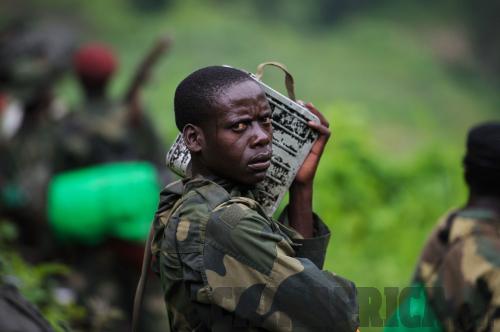| 
The children of deceased police and army officers in North Kivu Province, east Democratic Republic of the Congo (DRC), have found themselves forced into the army in order to support their families. These children often inherit their careers from their late fathers, and must take on these positions so their families can survive.
When it comes to military and police jobs, children often pick up where their parents left off for fear of losing work benefits like health care and accommodation in the army barracks.
"My father was a policeman and when he died they wanted to evict us from our house at the camp, but we had nowhere to go," said Pistchen Kalala to Inter Press Service (IPS). "We had to find a way to keep the family together, so I decided to become a policeman to help provide for my family, otherwise we would have been homeless and without health care." Kalala became a police officer at the age of 20.
Low income
Congolese soldiers have an income of around $80 a month, which is considered very low in the DRC. This means few can afford to own even a small home.
After his father died and his mother remarried to another solider, Dibwa Ntambwe, 24, joined the army. He decided to become a soldier so that his brothers and sisters would still have access to the benefits his father accrued.
Around three-quarters of Congolese soldiers are the children of soldiers, according to Augustin Lukubashi, Chairperson of local NGO Integrated Development Association for Police and Army Children. He is also the child of a deceased soldier.
Lukubashi's estimates are based on information from the police and army communication departments in Goma, the capital of North Kivu.
"Often, when a military parent dies, the children receive their monthly salary, which encourages them to follow the same career," Lukubashi told IPS, adding that it was policy for children to receive their deceased fathers' salaries, sometimes for up to two years after his death.
He added, "Living in a military family means living a military life where you grow up in hardship. Army children are well prepared for life in the military."
Sometimes, against their better judgment, army widows encourage their sons to join the army or police at 18 in order to protect their families.
"When my husband died, they wanted to throw us out of the house we lived in because when a soldier dies, there is a tendency to forget his family," said Sifa Nyota, an army widow in Goma.
"To continue to receive benefits - health care and accommodation - we decided that our oldest son should take his father's place [and join the army]. That's how he became a soldier," she explained to IPS.
Rights violation
Human rights NGOs in North Kivu have protested that this is a violation of the rights of the child, as many of these children have no choice but to become soldiers just like their late fathers. NGOs say that the government should assist these children to further their studies and to embrace other careers.
"The situation these children find themselves in is unacceptable. They should be taken care of by the Congolese Government, which should take responsibility for their basic needs and safety," Duffina Tabu, the chair of the Volunteers Association of Congo, a local NGO, told IPS.
Similarly, Flavien Ciza, a member of the provincial coordinating group of civil society organizations, said, "The precarious living conditions, poverty and unemployment experienced by these children, and their neglect by the government, is at the root of this social trend."
According to a 2011 study on poverty in the DRC, "70 percent of households live below the poverty line of less than a dollar a day."
"The Congolese Government should think about educating these children and provide them with a minimum income so that their futures are safe," Ciza said.
(Source: IPS) |